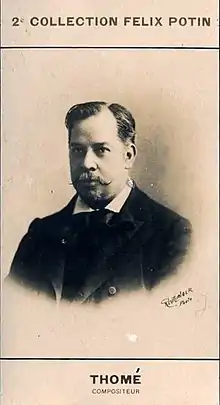
Francis Thomé (18 October 1850 – 16 November 1909), was a French pianist and composer.[1]
He was born in Port Louis, Mauritius, and studied at the Paris Conservatoire with Jules Duprato and Ambroise Thomas. After leaving the Conservatoire, he became well known as a composer of salon pieces and was in demand as a pianist and teacher. His music was particularly successful in the French provinces, and two of his operas were first performed outside Paris.[2] He became popular towards the end of the 19th century as a composer of accompanied poems, but is also known for his stage works, which encompassed various genres, including ballet, pantomime, incidental music (for a wide range of plays), bluettes, and operettas, such as Le Baron Frick (1885), the latter collaboration with Ernest Guiraud, Georges Pfeiffer, and Victorin de Joncières.[3]
References
- ↑ "Francis Thomé: Fantaisie (Cornet / Trumpet and Piano)". robertkingmusic.com. Retrieved 2018-09-22.
- ↑ "Francis Thomé (composer) - Discography of American Historical Recordings". adp.library.ucsb.edu. Retrieved 2018-09-22.
- ↑ "Category:Thomé, Francis - IMSLP/Petrucci Music Library: Free Public Domain Sheet Music". imslp.org. Retrieved 2018-09-22.
Sources
- Article by David Charlton in the New Grove Dictionary of Opera, edited by Stanley Sadie (London, 1992). ISBN 0-333-73432-7 and ISBN 1-56159-228-5
External links
- Works by or about Francis Thomé at Internet Archive
- Free scores by Francis Thomé at the International Music Score Library Project (IMSLP)